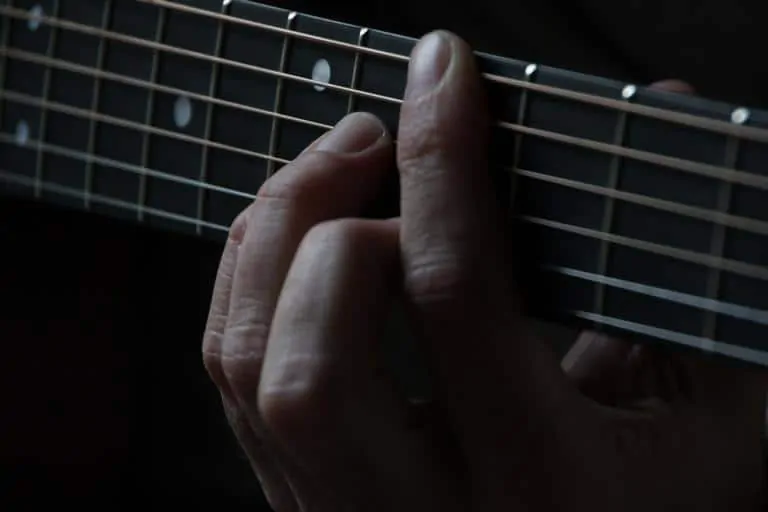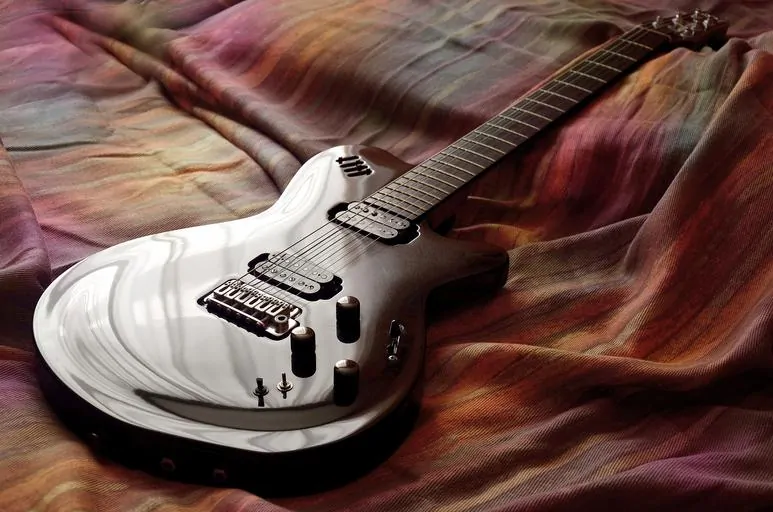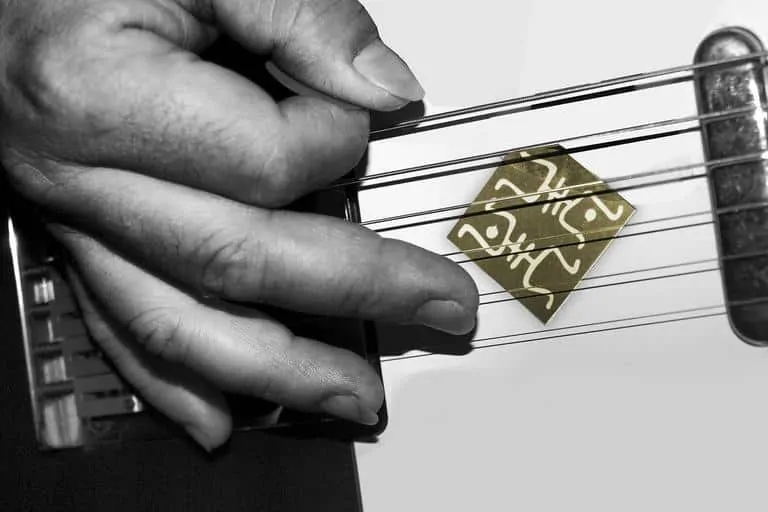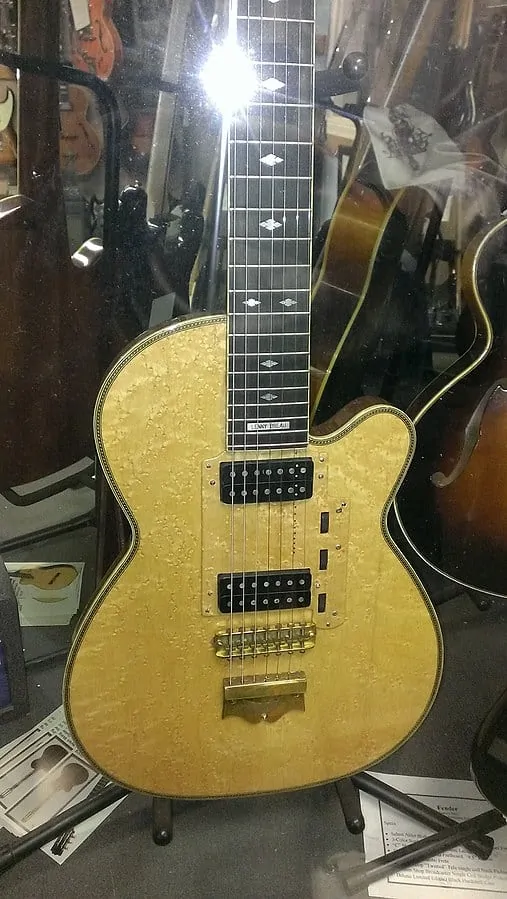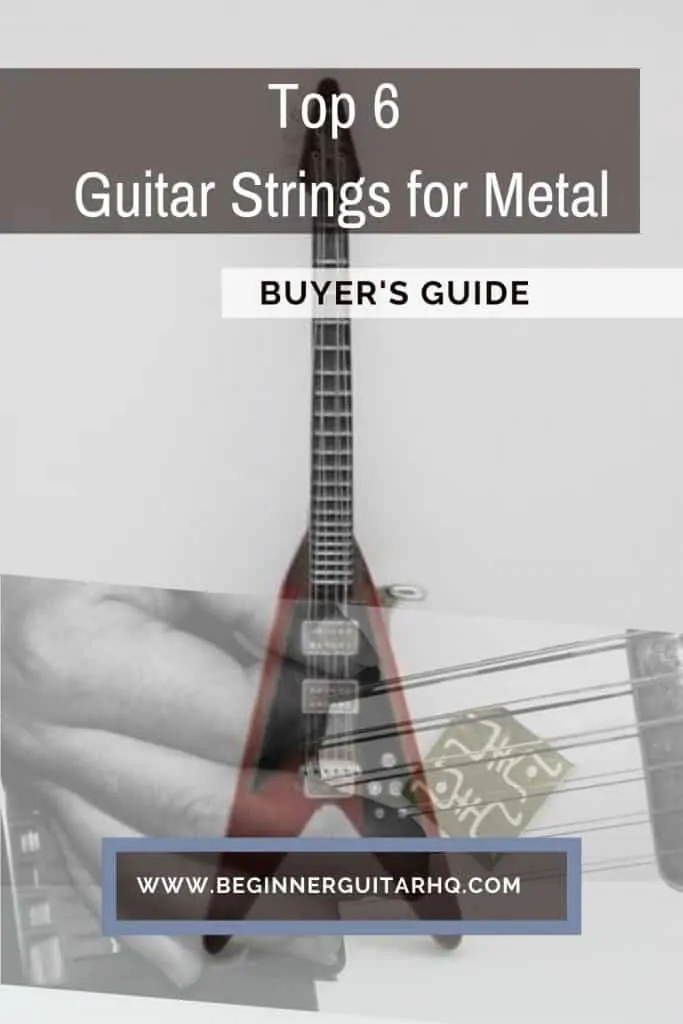Changing the guitar strings is like putting oil on your car’s engine or like putting air on your tires. It brings back your guitar to life with the crispness and brightness a new set of guitar strings delivers.
And when going live, even slight improvements will yield good results. Besides, I’m not even counting how the right string sets prevent unnecessary mistakes and technical troubles. Otherwise, old guitar strings break up, sound ugly, and look rusty. Plus, metal genres require stronger strings than other genres.
That said, we’re here to choose the top 6 best guitar strings for metal. If you thrive for heavy metal, rock, and riffs, these reviews are for you.
We’re also going to share some buyer’s advice with the basic specs you need to understand guitar strings. My goal is to help you make an informed decision.
Metal strings are heavier than your typical guitar string.
Contents
A quick insight into your metal gear
Before you dive into the most extreme edges of the genre, there’re a few prior considerations, especially if you’re a beginner.
First off, I hope you already have a good metal guitar, like the Schecter Omen 6 or the Ibanez GRX20. Otherwise, you won’t reach your potential, not even with new strings.
More importantly, I hope your guitar packs both the attitude and the sound. It should be, at least, something with humbucking pickups, as these have high-outputs and noiseless operations. Here’s an additional list of the best metal pickups. You could even consider changing the stock tapers on your guitar for a better set.
Up next, you can nail that guitar tone with the right metal amp. The right metal amp features a top-notch distortion channel, plenty of gains, and plenty of headroom. If it delivers a couple of extra effects, that’s great. Here’s our list of the top 10 metal amps.
As a follow-up, you could also consider getting yourself a guitar distortion pedal. Because we’re talking about metal, then you’re in dire need of a metal distortion pedal. Check this guide to search for the best models, we even got a couple of budget options.
The final link on your chain is the right strings, which is an important factor in your dirty guitar tone. And here’s where I’m helping you with a quick review of the top 6 best strings for metal you can buy right now.
A metal guitar should have high-output humbuckers, a fat sound, fair versatility, a fast neck, and solid intonation.
Buyer’s advice on metal strings
Even when the strings do not affect your sound as much as the rest of the chain, any good guitar player pays attention to the strings.
In particular, you have to change your strings every 6 months or so (in theory), even more, if you’re going life regularly. And every time you swap the strings, you or the luthier needs to take care of the frets, the nut, and the bridge to leave everything clean and buzz-free.
The wrong strings, as well as old strings, sound bad. More than that, they can snap just in the middle of your presentation.
Metal music requires strings with certain characteristics so they don’t snap. Instead, they have to resist aggressive attacks, string bends, angry riffs, down-tunes, and similar.
That means metal players (trash, goth, sludge, stoner, progressive, heavy, alt, death, or whatever it is) don’t use “standard” strings.
Let’s check the things you need to know before we go to the reviews of the best strings for metal.
The most important factor to consider when looking for strings for metal is the gauge (the thickness)
About strings gauge
Metal strings use a specific gauge that ensures they won’t break on down tunes. Additionally, they have an increased tension to resist down-tunes and aggressive playstyles.
Electric guitar strings come in a variety of thicknesses (gauges). The gauge has a large influence on its playability, as well as some influence on the sound the guitar produces.
Thicker strings deliver warmer responses, but they are also stiffer and harder to bend. Thin strings are brighter and easier to play but may sound tiny on some instruments.
- Light Gauge: they are easier to play and bend, soft on the hands, and welcoming for beginners. They are ideal for vintage guitars and don’t put too much pressure on the neck as they don’t have too much tension.
- Heavy Gauge: they are harder to play as they require extra pressure for bends and chords, but they offer punchier tones, more sustain, and a heavier output. They also resist down tunes as they have a lot of tension, which means they won’t go loose as you tune the guitar on Drop D. A heavy set is typically around .12-.054
- Medium Gauge: the in-between option for the all-hands player.
Heavy strings are harder to play with because you need more pressure to fret the note. That means bending and playing chords is more difficult and painful than on light strings.
Here’s the rundown on guitar gauges:
| Size | E | B | G | D | A | E |
| Super Extra Light | .008 | .010 | .015 | .021 | .030 | .038 |
| Super Light | .009 | .011 | .016 | .024 | .032 | .042 |
| Light | .010 | .013 | .017 | .026 | .036 | .046 |
| Medium | .011 | .015 | .018 | .026 | .036 | .050 |
| Heavy | .012 | .016 | .020 | .032 | .042 | .054 |
Sometimes you’ll see the gauge indicated by the thickness of the high E. For example, a heavy gauge would be “.012.”
Here’s a video showcasing how the right heavy gauge strings can sound:
<iframe width=”740″ height=”416″ src=”https://www.youtube.com/embed/TlaUACGYRf4″ frameborder=”0″ allow=”accelerometer; autoplay; encrypted-media; gyroscope; picture-in-picture” allowfullscreen></iframe>
Hybrid strings
This is where hybrid strings shine, as they pair heavy gauge bass strings with light treble strings, which gives metal guitar players the best of both. A hybrid string might go something like:
| Size | E | B | G | D | A | E |
| Hybrid | .010 | .013 | .017 | .032 | .042 | .054 |
Hybrid strings are the best choice for metal. However, they might feel weird and clunky on beginner’s hands.
The string gauge is indicated by its thickness diameter. The number you see is 1/1000 of an inch. For instance, a .010 gauge means 0.01 diameter inches. Guitar packs are numbered from the thinnest string (.08 /.08 / .010 0.11) to the thickest.
About strings length
Another string spec is the scale length. The guitar’s scale length is the vibrating portion of the strings (you can read more about guitar specs on this beginner’s buyer’s guide).
Commonly, we get two different string scales:
- Fender Scale: Fender guitars are 25.5’’, the same scale as most metal guitars, Stratocasters, Strat copies, SuperStrats, Telecaster, Telecaster copies, and similar.
- Gibson Scale: Gibson guitars have a 24.75’’. All Gibson copies also feature the same length.
<iframe width=”960″ height=”566″ src=”https://www.youtube.com/embed/UkG8Ga9aFfo” frameborder=”0″ allow=”accelerometer; autoplay; encrypted-media; gyroscope; picture-in-picture” allowfullscreen></iframe>
About strings materials
Guitar strings are constructed with a wire wounding above a metal hexagonal or round core. The wire material is very important, and there are three:
- Steel: bright and lively but harsh on the fingers. They add increased high-end presence, which helps the guitar cut through the mix.
- Nickel: rich, round, warm, and soft on the fingers, but with a lower presence on the bass.
- Nickel-Plated: the common ground between nickel and steel. These are nickel strings plated with steel for a beefier low-end response plus the same cutting treble. These are the overall versatile choices.
Bronze and brass materials are for acoustic and electro-acoustic guitars. Nylon is the string material for classical guitars.
About strings core metal
Core metal also plays a role in overall tone whilst it affects the tension of the strings. The core commonly has an octagonal shape.
- Stainless steel
- Titanium
- Cobalt
- Chrome
- Copper
Heavy gauge strings need steel cores (also titanium, cobalt or chrome). Steel cores have octagonal shapes, while other materials may ship with a round shape.
About string coating
There are coated strings, which refers to a plastic polymer layer covering the string. Coated models have increased durability plus a tendency for a high-end response.
Keep in mind coated strings more than regular models, but last about twice as long.
Also, remember that the longer you play your strings, the less bright they sound. Old strings begin to sound rusty, out of tune, and muddy as they receive oils, rust, dust, dirt, and skin cells.
About string winding
The winding refers to how the wire is wrapped around the solid metalcore.
- Roundwood: or simply “wound” features a textured surface. The texture comes because the wire is round and is wounded around a metal core. Roundwounds have a shorter life, create more string noise, and wear on the frets more. However, they create a longer sustain, brighter tones, and lower tension.
- Half-round: these are no longer in production, so don’t even bother.
- Flatwound: these are flat wounds because the wire is smooth. Their sound is warmer and on the mellow side.
Lenny_Breau_7-String_Guitar/ teakwood / CC BY-SA 2.0 The extra strings of a 7-string guitar belong to the “lower B” (or lower D) sitting above the Stringsguitar strings for metal
We’re looking for something that fits your metal ax. It should be steel or nickel wound strings with a metal core. They should also have a heavy gauge or a hybrid gauge. If you have a 7 or 8-string guitar, you should take a pack with the proper number of strings.
These are the most popular strings for metal, and they are popular choices for a reason.
Let’s go into our reviews of the top 6 guitar strings for metal. I’m highlighting a particular model for each brand I list, but then I’m adding a couple extra models for some of these brands. Be sure to check everything!
If you can’t find these strings available, you could search for the same specs on brands like D’Addario, Fender, GHS, Elixir, Marin, Ernie Ball, and DR. The difference between a good set in a budget set is literally pennies, so don’t go cheap on yourself.
Dunlop DHCN1254 Heavy Core
| Nickel-wound & steel core | Heavy gauge (.012 – .054) |
Engineered specifically for drop tunings, the Heavy Core strings are the most popular choice for heavy rockers, shredders, and metalheads because of its innovation and affordability.
Jim Dunlop, a Scottish engineer, founded the company in California, USA, back in 1965. Nowadays, it’s one of the main musical gear and peripherals suppliers.
Their strings are best-sellers for professional artists like Mastodon’s Bill Kelliher, Nevermore’s Jeff Loomis, and Avenged Sevenfold’s Zacky Vengeance. On top of that, Dunlop also offers signature strings for various artists, which includes the Kerry King Icon Series.
Their Heavy Core strings are made specifically for drop tunings with tight nickel-wound steel. The series comes in “Heavy,” “Heavier,” and “Heaviest” gauges. The latter two are .012 – 0.54, perfect for the most aggressive leads.
The DHCN1254 is a “heaviest” gauge set. It goes from .012 to .054, proper measures for speedy metal genres and heavy rock styles. The set is made with carefully chosen wire. Furthermore, the wire is wrapped, which protects the integrity of the strings so they don’t snap or fall out of tune.
This Heavy Core set is not only great for distortion. It also plays beautiful cleans on your combo amp.
DR Strings DDT-11
| Nickel-plated & steel core | Hybrid gauge (.011 – .054) |
D’Addario and Dunlop are on every guitar strings chart, whereas Dr. Stings (despite its obvious name) is the lesser-known brand. Nevertheless, their offerings are built for shredders in mind, and the features of this popular set showcase their expertise.
The Drop Down Tuning Series (DDT) set is made using a proprietary tech named “ACT.”. These strings have a coated hexagonal core that locks on the nickel-plated steel wrapping wire in place. That increases stability and maintains tuning for longer.
That’s how these strings hold down tunes and aggressive play styles better than most. Plus, they have a very long lifespan (about a year).
The gauge is like so: .011, 0.15, 0.19, 0.32, 0.42, .054, enough to consider the DTT’s as hybrid strings. They are stable and have a medium thickness on the lows with plenty of fatness on the highs.
- Strings are the preferred choice of an impressive roster of professional metal players, including Meshuggah, Fozzy, Reaping Asmodeia, and Gus G. (Ozzy Osbourne’s guitarist).
Shredding alternative: DR Strings Dimebag Darrel Signature Series
For fans of the great and late Dimebag Darrel, you can also choose DR Strings Dimebag Darrel Signature Series. The company made strings for Pantera’s guitar player right until his last moments in 2004.
These come in heavy gauges and ship treated with DR’s polymer coating for extra durability. Plus, they pack insane neon colors to create a sinister persona on the stage.
D’Addario EXL117
| Nickel-wound & steel strings with steel core | Hybrid gauge (.011 – .054) |
An absolute bestseller, D’Addario XL Nickel Wound Guitar Strings are long-lasting, bright, and tough. They are made to resist drop-D tunings, metal riffs, and fast solos.
This is a unique set as it includes both nickel wound and steel strings. Here’s what you get in the package:
- Plain steel: 0.11 , 0.13, 0.19.
- Nickel wound: 0.32, 0.44, .056
That makes this a full hybrid set where the high strings are made of metal and the lows are made of nickel. It gives maximum comfort and versatility for any kind of genre. All-hands leading guitar players are going to be very happy with these ultimate performers.
On top of that, the D’Addario XL set features a high-quality carbon steel core for a brighter tone, increased intonation, and better magnetic resonance for the pickups.
You should know that D’Addario is the top string manufacturer. They are known for their top-tier service and packaging, and so a D’Addario package is sealed from the inside out to keep the strings fresh and new.
Alternative: D’Addario NYXL 1254
The D’Addario NYXL string series is wide and covers a lot of metal genres. They are about offering improved finger dexterity with higher tension, longer sustain, and spot intonation.
More so, the NYXL features the company’s top-tier automatic winding tec, which increases resistance on guitar and bass strings.
The 1254 is a nickel-plated hybrid set with a steel core. Like the model below, it offers three nickel wound strings plus three steel wounds, but they are all heavy (.012, 0.16, .020, 0.32, 0.42, 0.54).
Lastly, the set features an enhanced mid-range frequency response that makes it easier for your rock guitar to cut through the mix.
Ernie Ball Not Even Slinky
| Nickel-plated wound & steel core | Heavy gauge (.012 – .056) |
Chosen by legendary artists like Eric Clapton, Jimmy Page, Angus Young, and Keith Richards, Ernie Ball is a brand you can trust.
Ernie Ball was founded in 1962 and has helped shape the sounds of rock & roll, and their “Slinky” series is an all-time best-seller.
The “Not Even Slinky” is made for metal players. They are made with high precision wound nickel-plated steel with a carbon steel hexagonal core.
They are also super heavy. The gauge is .012 – 0.56, so you can expect a thick metal experience. Plus, they are protected with a special RPS micro coating for extra durability.
If you need to know, Ernie Ball is also the main supplier of classic rock & metal bands such as Judas Priest, Metallica, Iron Maiden, System of a Down, and John Petrucci.
I highlighted the “Not Even Slinky” strings over the models below because it boasts a longer lifespan than the others for an affordable price, which is probably what you’re looking for.
Popular alternative: Ernie Ball Power Slinkys
Metallica’s James Hetfield is a known user of Ernie Ball’s Power Slinkys.
This is a heavy gauge set (.011 -0.48) that’s able to deliver chunky chords and powerful tones,
An absolute best-seller as well.
Alternative: Skinny Top Heavy Bottom Hybrid Set
Lastly, the Skinny Top Heavy Bottom is a hybrid set with the security of heavy lows (0.30, .042, .052) plus the brightness and playability of light trebles (0.10, .013, .017).
Elixir Heavy Gauge Guitar Strings
| Nickel-plated wound & steel core | Heavy gauge (.012 – .052) |
Elixir strings are more often on the pop-rock side as in their main suppliers of Imagine Dragons’ “guitar player.”
Still, their (unnamed) heavy gauge strings are a perfect choice for those metal players looking for something simple and reliable.
Like all Elixir strings, this nickel-plated set is coated with a thin NANOWEB™ material that provides additional texture. This patented coating tech gives strings superb protection against corrosion, dust, rust, skin cells, and similar. It extends the life and their tone longer than any other brand.
That’s great for a heavy gauge string set (0.12 – 0.52). It makes them long-lasting and premium looking. It also gives the strings a great feel. In particular, the NANOWEB coating is ultra-thin and allows the strings to sound crisper and brighter.
Nanoweb protects both the inner core and the outer surface of the strings, where the common tone degrading gunk and corrosion accumulates.
Furthermore, Elixir strings carry a Signature Anti-Rust Plating that ensures longer lifespans.
Stringjoy HV10 Nickel Strings
| Nickel-plated wound & steel core | Hybrid gauge (.010 – .052) |
I’m closing the chart with the lesser-known brand Stringjoy, another USA-based string manufacturer.
Their strings are smooth and soft on the fingers, which is a particular treat for heavy gauge strings. The company explains they use “mathematics” to enhance balance tension and deliver a smooth performance across the entire fingerboard.
In particular, these strings have great intonation plus a powerful resonance. Furthermore, they boast superb tension resistance.
In summary
Bright or warm?
Picking your right metal gear is mostly about “warm” vs “bright” sound, which isn’t easy to understand as this is a subjective matter.
Either way, warm refers to smoothness and an easy-going tone with a bit of thickness. Bright refers to saturation, cleanliness, and an overall more metallic tone.
You need brightness to cut through the mix with your solos. But you also need some warmth to avoid sounding artificial. Your guitar strings must strike a good balance between these two properties, like nickel or nickel-plated with a steel core.
We’ve already covered the best brands and the best strings for metal, so I hope you can fix up your guitar with something great.
You’ll know when it’s time to change the strings when they begin to get rusty, muddy, and loosened.

